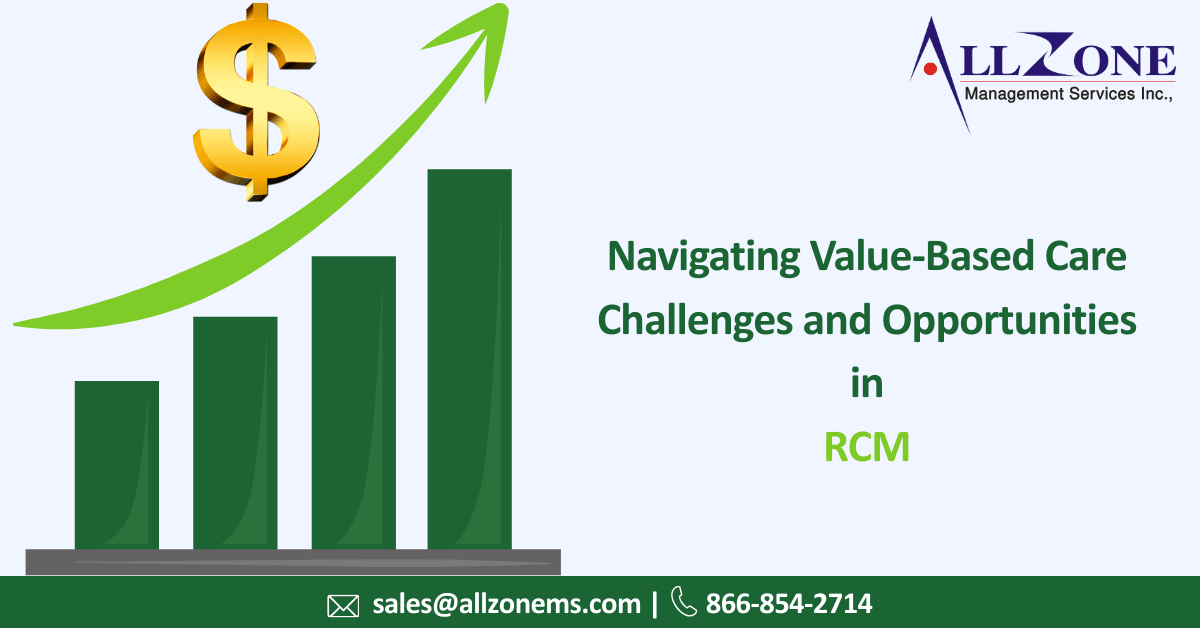RCM and Value-Based Care Challenges and Opportunities:
Healthcare is a dynamic field constantly evolving to improve patient and staff experiences. As the industry transforms, it’s crucial to understand both the potential benefits and drawbacks of these changes.
One area experiencing significant evolution is Revenue Cycle Management (RCM). The shift towards value-based care models is a positive step, but it also introduces new challenges and opportunities. How RCM practices are adapting to new payment models and the implications for healthcare organizations in the face of value-based care challenges.
Improving RCM for Value-Based Care:
The transition to value-based care (VBC) demands a radical overhaul of revenue cycle management (RCM) practices. Unlike fee-for-service, VBC rewards providers for superior patient outcomes and efficient care, not simply service volume. This necessitates a comprehensive RCM strategy that integrates clinical, operational, and financial data for a holistic performance view.
However, the transition to VBC presents significant challenges. A major hurdle is the requirement for sophisticated data analytics to accurately measure and report on patient outcomes and care costs. Healthcare organizations must invest in technology that can aggregate and analyze data across the entire patient journey. Additionally, developing new workflows to support care coordination and population health management is crucial
The Reality of Value-Based Care: A Reimbursement Model:
Value-Based Care (VBC) is often misunderstood as prioritizing patient outcomes, but in reality, it’s primarily a reimbursement model that rewards providers for adhering to clinical guidelines and achieving population-level health metrics. While there are incentives for improved overall health, individual patient outcomes are not directly tied to financial rewards.
Demonstrating compliance with these guidelines through complex documentation is a significant challenge. Effectively managing the claims process and identifying potential issues early on is crucial to preventing substantial financial losses. By harnessing the power of data analytics and business intelligence, revenue cycle management can shift from a reactive to a proactive approach, optimizing financial performance within the VBC landscape.
Unlocking Hidden Value in Healthcare Revenue Cycle Management:
Data analytics can transform healthcare revenue cycle management (RCM) by uncovering hidden trends and patterns within massive datasets. By identifying potential issues before they escalate, organizations can proactively address challenges and optimize financial performance.
For instance, analytics can pinpoint rising denial rates for specific providers or payers. Armed with this knowledge, healthcare organizations can implement targeted solutions, such as enhanced coding training or strategic payer negotiations.
Predicting the Future, Driving Better Outcomes:
Business intelligence (BI) tools harness the power of historical data to forecast future performance. This enables data-driven decisions around resource allocation and staffing to align with anticipated claim volumes and reimbursement trends. Predictive analytics can also identify potential claim denials based on specific characteristics, allowing for early intervention and accelerated reimbursement.
Real-Time Insights for Immediate Action:
BI dashboards offer real-time visibility into critical performance indicators (KPIs) such as claim submission rates, denial rates, and collection times. This empowers organizations to swiftly address issues when KPIs deviate from desired targets. For example, a sudden spike in claim rejections could signal a systemic coding error requiring immediate correction.
By leveraging data analytics and BI tools, healthcare organizations can significantly improve RCM efficiency, reduce revenue leakage, and enhance overall financial health.
RCM: A Strategic Imperative in Value-Based Care:
To thrive in value-based care, Revenue Cycle Management (RCM) must evolve from a transactional to a strategic function. Given the holistic nature of value-based reimbursement models, which emphasize patient health and experience, RCM teams should incorporate expertise from clinicians, coders, and compliance to optimize claim coding, billing, and submission. By adopting a data-driven approach to identify and address root causes of RCM value-based care challenges, organizations can develop sustainable solutions that drive improved patient outcomes and financial performance.
RCM: The Financial Backbone of Value-Based Care:
Both payers and providers are driven to curtail healthcare costs, and Revenue Cycle Management (RCM) is pivotal in demonstrating the value proposition of value-based care (VBC). RCM services play a crucial role in this transition by streamlining financial processes and ensuring accurate reimbursement. Hierarchical Condition Category (HCC) coding, for example, aids the VBC transition by providing a comprehensive patient health snapshot, enabling better resource prediction.
While various metrics, like patient days, infections, and readmissions, can measure VBC, their impact on cost reduction while preserving or enhancing care quality remains crucial. RCM companies leverage these metrics to connect clinical outcomes with financial performance, helping providers assess the true effectiveness of their VBC strategies. RCM is the key to deciphering VBC’s effectiveness by connecting decision-making tools with metrics like readmissions and costs to assess goal achievement and revenue accuracy.
Aligning patient care with financial metrics is essential to validating VBC. Without this link, VBC’s efficacy is uncertain. RCM services provide critical insights into collection costs, patient revenue, and overall care expenditures, holding the answer to VBC’s viability. As such, RCM companies and their solutions deserve paramount importance in the evolving VBC landscape.
The Convergence of Value-Based Care and Technology:
The shift to value-based care is undeniably reshaping the healthcare landscape, prioritizing quality outcomes over service volume. This evolution is driving innovation in care coordination and risk management. We anticipate a surge in tools and technologies designed to support these critical areas in the coming years.
The convergence of revenue cycle management and advanced technology is particularly exciting. Health systems that strategically invest in AI and automation will be well-positioned to thrive in this new era.

